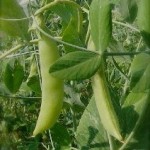Upcoming plant sales
April 14, 2009 @ 1:39 am
There are some great plant sales coming up in the next few weeks. We want to call your attention to two sales in Seattle in early May. 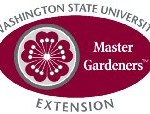
As Master Gardeners, both Andy and I will be volunteering to help the Master Gardener Foundation of King County with its annual plant sale. There’s a huge selection of annuals, perennials, vegetables, trees and more. Many are grown by local master gardeners, while some professional nurseries will also be on hand to sell their goods. Proceeds go toward paying for the Master Gardener clinics, demonstration gardens, youth programs and more. The Master Gardener Plant Sale is May 2-3, 2009 at the University of Washington Center for Urban Horticulture, 3501 NE 41st St, Seattle. Hours are Saturday, 8 a.m.-5 p.m.; Sunday, 10 a.m.-3 p.m.
If you’re into growing vegetables, head to the Seattle Tilth Edible Plant Sale that same weekend. I’ll be volunteering to help out with this sale, which offers the  largest selection of organically and sustainably grown vegetable starts in Seattle. You’ll find over 50 varieties of tomatoes and 20 varieties of peppers, rare and heirloom veggie varieties, an extensive selection of culinary herbs, edible flowers, and drought tolerant perennials. The list of starts includes ‘Fairy Tale’ eggplant, lemon cucumbers, golden midget watermelon, ‘Cajun Delight’ okra, ‘Gypsy’ sweet peppers and much more. Find the lists of items on sale here. The sale is May 2-3, 2009 at Meridian Park in Seattle’s Wallingford neighborhood, 4649 Sunnyside Ave. N. Open 9 a.m.-3 p.m. Saturday & Sunday.
largest selection of organically and sustainably grown vegetable starts in Seattle. You’ll find over 50 varieties of tomatoes and 20 varieties of peppers, rare and heirloom veggie varieties, an extensive selection of culinary herbs, edible flowers, and drought tolerant perennials. The list of starts includes ‘Fairy Tale’ eggplant, lemon cucumbers, golden midget watermelon, ‘Cajun Delight’ okra, ‘Gypsy’ sweet peppers and much more. Find the lists of items on sale here. The sale is May 2-3, 2009 at Meridian Park in Seattle’s Wallingford neighborhood, 4649 Sunnyside Ave. N. Open 9 a.m.-3 p.m. Saturday & Sunday.
If you need help finding the right plant to fit into your Seattle landscape, Ecoyards is here to help. We love assisting clients to find the right perennials, trees, even edible plants, to incorporate into an existing landscape or add to a newly-designed landscape. Email us or give us a call at 206-770-7879.
Filed under Seattle Landscape Design, Seattle Landscape Maintenance, Vegetable Gardening Permalink · No Comments »
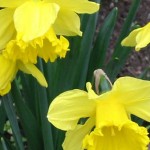 lately. Despite that, daffodils and forsythia are strutting their stuff, tulips are poking through the cold ground, cherry blossoms are in full bloom, and we just noticed some blooming trillium deep in the woods of
lately. Despite that, daffodils and forsythia are strutting their stuff, tulips are poking through the cold ground, cherry blossoms are in full bloom, and we just noticed some blooming trillium deep in the woods of 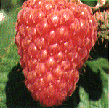 Apply about 3/4 to 1 pound of ammonium sulfate per 100 feet of row. Give blueberries a spring application of a balanced fertilizer such as 5-10-10.
Apply about 3/4 to 1 pound of ammonium sulfate per 100 feet of row. Give blueberries a spring application of a balanced fertilizer such as 5-10-10.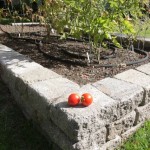 I recommend growing vegetables in raised beds, wherever possible. Your bed could be as simple as a large mounded pile of soil, or as fancy as one made from cedar boards or, as pictured to the left, made from RomanStack blocks. Raised beds help drain water better and warms the soil up quicker so that you can extend your planting season. It helps keep weeds out of the bed, and prevents your soil from becoming too compacted from excess foot traffic. Ecoyards has made several lovely raised beds for clients, including the one pictured at left.
I recommend growing vegetables in raised beds, wherever possible. Your bed could be as simple as a large mounded pile of soil, or as fancy as one made from cedar boards or, as pictured to the left, made from RomanStack blocks. Raised beds help drain water better and warms the soil up quicker so that you can extend your planting season. It helps keep weeds out of the bed, and prevents your soil from becoming too compacted from excess foot traffic. Ecoyards has made several lovely raised beds for clients, including the one pictured at left.